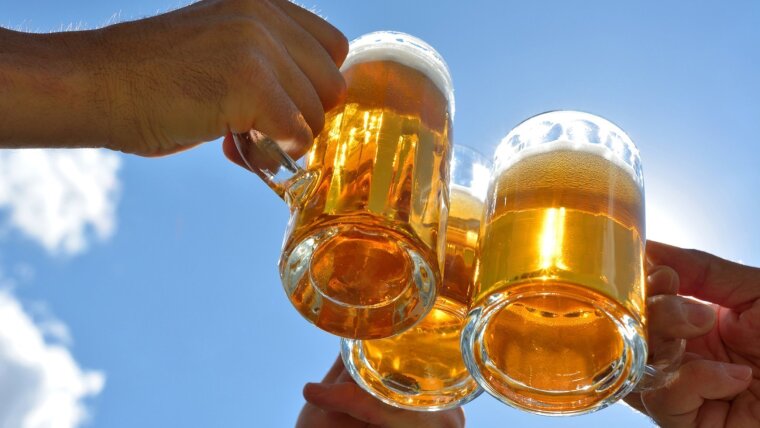
How do we decide what we have an appetite for? Why are we sometimes unable to control ourselves, dipping into a bag of crisps time and again until it’s empty? How is it that some people even become addicted? These questions are the subject of medical research at Jena University Hospital. Dr Alexander Refisch and his team are examining the links between addictive behaviour and an individual’s microbiome, deciphering the signals transmitted by the gut to the brain.
By Stephan Laudien
Imagine a turbulent meeting: everyone present is speaking at once, shouting other people down and refusing to let anyone finish. After a while, the dispute turns physical. Amid the pushing and shoving, as scuffles break out, the strong intimidate the weak. As a result, the quieter members’ arguments go unheard. But what is this heated argument all about, anyway? Well, it centres around aspects of healthy nutrition and, ultimately, boils down to a single question: a glass of water or a bottle of beer?
Microbiome and addiction
These »meetings« are convened on a daily basis—behind closed doors, inside each of us, in the human gut. The participants are tiny microbes, millions of which live in our intestines. In total, our microbiome can account for up to two kilograms of biomass. Much of the microbiome remains uncharted terrain, with researchers only now beginning to understand the relationships between microbes and their impact on humans.
Portrait of Dr Alexander Refisch
Image: Uta von der Gönna»We’re working to uncover connections and identify initial patterns,« says Dr Alexander Refisch. The 38-year-old Cologne native became a senior physician at the Clinic of Psychiatry and Psychotherapy at Jena University Hospital in 2021. He has been working with patients with addiction since 2023. Now, Refisch hopes that his research group will enable more detailed research into the influence of the microbiome on addictive behaviour.
There is growing evidence that changes in microbiome composition, especially during the formative early years, perhaps shaped by traumatic childhood experiences, play a decisive role. These changes appear to have a particularly close connection with impairments in social function and increased susceptibility to stress—two key factors in the development and maintenance of addictive disorders. »People with addictions have often had overwhelmingly negative relationship experiences,« explains Refisch.
In many cases, these experiences lead to social isolation and an increased tendency to consume alcohol. For a current example of this relationship, we can turn to the increased alcohol consumption per capita during lockdown periods in the COVID-19 pandemic, which was fuelled in considerable part by the loss of social reinforcers.
Alcohol consumption indicates stress
A link also exists between stress and alcohol consumption. »Many people regard alcohol as a tried-and-tested means of reducing stress,« says Alexander Refisch. Yet, as Refisch points out, alcohol increases the sensitivity to stress and, as a result, amplifies the desire for a glass or two in order to relax. In the end, he says, consuming alcohol is a latent means of keeping stress levels elevated. Keeping a tight grip on the glass leads to people ignoring other stress-reduction strategies, for example going for a walk, reading a good book or watching a film, these lose their appeal. This, in turn, harms social relationships, which is why many people with addiction also struggle with isolation.
Alexander Refisch and his research group want to take a closer look at a cohort of patients. Based at the German Center for Mental Health (Deutsches Zentrum für Psychische Gesundheit), this project aims to examine patients’ addictive behaviour and psychology as well as their individual microbiome.
Sequencing techniques also used in genetic analysis will be used to determine patients’ microbiome make-up. Alexander Refisch believes that the key to new therapies could lie in the world of microbes. »The microbiome is not static—it’s highly variable,« he says. »While alcohol has a negative impact on microbe composition and psychological functions, a change in diet and lifestyle could have a positive effect.« Refisch also underlines the need to remember that humans have evolved in a world dominated by microbes. »At present, we only understand these relationships in very broad terms. We’re still in the very early stages of our research.«
Signals between the gut and the brain
Even now, however, numerous aspects indicate the influence of microbes on human behaviour. Researchers have their sights set on immunologic and inflammatory messenger molecules that can be modified by the microbiome. The Jena-based research group therefore hopes to shed light on the matter by comparing the microbiome of patients with addictions against samples from healthy patients.
Alexander Refisch says it is notable that around 80% of signals transmitted via the vagus nerve are sent from the centre of the body to the brain, while just 20% of signals travel in the opposite direction. »Under certain conditions, such as regular alcohol consumption, certain intestinal microbes can proliferate rapidly and displace other microbes. Given the direct connection between our gut and our brain, these microbes can influence and even amplify our desire for alcohol,« says Refisch. »Simply put, when these microbes grow, they can send signals to our brain that make us want alcohol.« These signals take the form of neuroactive substances produced by the metabolism of human microbes as well as substances produced by human cells in response to this microbial activity.
Given this explanation, it hardly seems unreasonable to picture a »meeting« of microbes arguing about whether a beer or a glass of water is the best way to quench a thirst.
07743 Jena Google Maps site planExternal link
